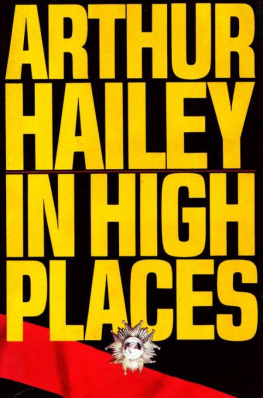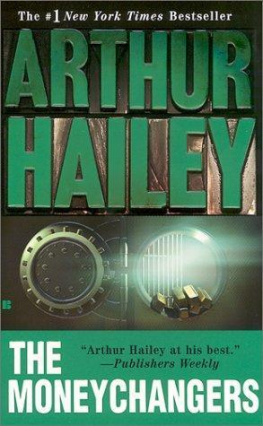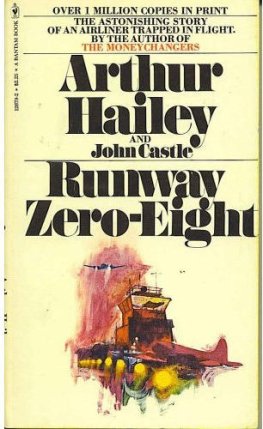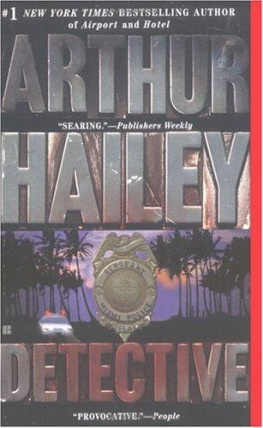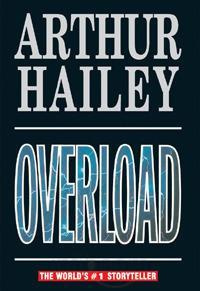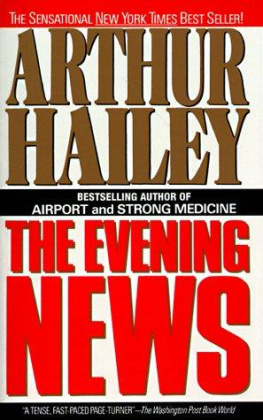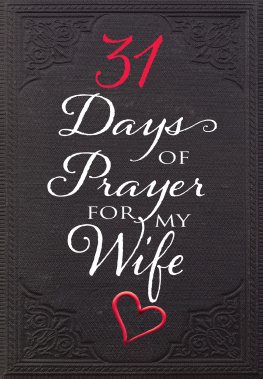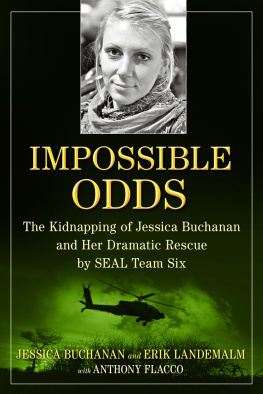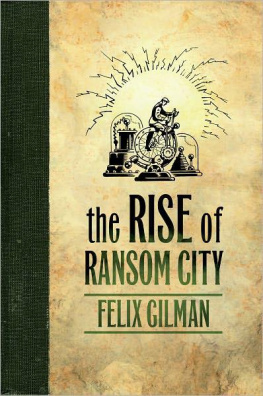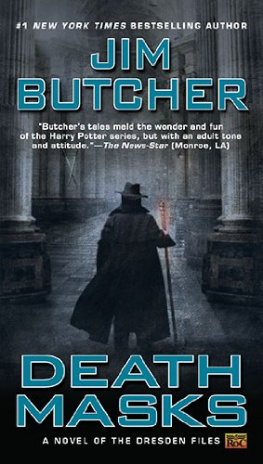ARTHUR HAILEY
THE EVENING NEWS
To Sheila and Diane with special gratitude and to my many friends in the media who trusted me with off-the-record information.
Author's Note: In Frederick Forsyth's novel The Day of the Jackal published 1971, an assassin obtains a fraudulent British passport. In The Evening News, a terrorist obtains such a passport-in a differing way, the description the result of my own research. However, I acknowledge that in this matter, Mr. Forsyth's footprints were there first.
-A.H.
At CBA Television News headquarters in New York, the initial report of a stricken Airbus A300, on fire and approaching Dallas-Fort Worth Airport, came only minutes before the network's first feed of the National Evening News.
It was 6:21 P.M. eastern daylight time when CBA's bureau chief at Dallas told a producer on the New York Horseshoe through a speakerphone, "We're expecting a big aircraft crash at DFW any moment. There's been a midair collisiona small plane and an Airbus with a full passenger load. The small plane went down. The Airbus is on fire and trying to make it in. The police and ambulance radios are going wild.
"Jesus!another Horseshoe producer said.What's our chance of getting pictures?
The Horseshoe, an outsize desk with seating for twelve people, was where the network's flagship news broadcast was planned and nurtured from early each weekday morning until the last second of air time every night. Over at rival CBS they called it the Fishbowl, at ABC the Rim, at NBC the Desk. But whichever name was used, the meaning was the same.
Here, reputedly, were the network's best brains when it came to making judgments and decisions about news: executive producer, anchorman, senior producers, director, editors, writers, graphics chief and their ranking aides. There were also, like the instruments of an orchestra, a half-dozen computer terminals, wire news service printers, a phalanx of state-of-the-art telephones, and TV monitors on which could be called up instantly anything from unedited tape, through a prepared news segment ready for broadcast, to competitors' transmissions.
The Horseshoe was on the fourth floor of the CBA News Building, in a central open area with offices on one sidethose of the National Evening News senior staff members who, at various times of day, would retreat from the often frenzied Horseshoe to their more private work quarters.
Today, as on most days, presiding at the Horseshoe's head was Chuck Insen, executive producer. Lean and peppery, he was a veteran newsman with a print press background in his early years and, even now, a parochial preference for domestic news over international. At age fifty-two Insen was elderly by TV standards, though he showed no sign of diminished energy, even after four years in a job that often burned people out in two. Chuck Insen could be curt and often was; he never suffered fools or small talk. One reason: under the pressures of his job there wasn't time.
At this momentit was a Wednesday in mid-September the pressures were at maximum intensity. Through the entire day, since early morning, the lineup of the National Evening News, the selection of subjects and their emphasis, had been reviewed, debated, amended and decided. Correspondents and producers around the world had contributed ideas, received instructions and responded. In the whole process the day's news had been whittled down to eight correspondent reports averaging a minute and a half to two minutes each, plus two voice-overs and four "tell stories. A voice-over was the anchorman speaking over pictures, a "tell story, the anchorman without pictures; for both the average was twenty seconds.
Now, suddenly, because of the breaking story from Dallas and with less than eight minutes remaining before broadcast air time, it had become necessary to reshape the entire news lineup. Though no one knew how much more information would come in or whether pictures would be available, to include the Dallas story at least one intended item had to be dropped, others shortened. Because of balance and timing the sequence of stories would be changed. The broadcast would start while rearrangement was continuing. It often happened that way.
A fresh lineup, everybody. The crisp order came from Insen.We'll go with Dallas at the top. Crawf will do a tell story. Do we have wire copy yet?
"AP just in. I have it. The answer was from Crawford Sloane, the anchorman. He was reading an Associated Press bulletin printout handed to him moments earlier.
Sloane, whose familiar craggy features, gray-flecked hair, jutting jaw and authoritative yet reassuring manner were watched by some seventeen million people almost every weeknight, was at the Horseshoe in his usual privileged seat on the executive producer's right. Crawf Sloane, too, was a news veteran and had climbed the promotion ladder steadily, especially after exposure as a CBA correspondent in Vietnam. Now, after a stint of reporting from the White House followed by three years in the nightly anchor slot, he was a national institution, one of the media elite.
In a few minutes Sloane would leave for the broadcast studio. Meanwhile, for his tell story he would draw on what had already come from Dallas over the speakerphone, plus some additional facts in the AP report. He would compose the story himself. Not every anchor wrote his own material but Sloane, when possible, liked to write most of what he spoke. But he had to do it fast.
Insen's raised voice could be heard again. The executive producer, consulting the original broadcast lineup, told one of his three senior producers, "Kill Saudi Arabia. Take fifteen seconds out of Nicaragua . . .
Mentally, Sloane winced on hearing the decision to remove the Saudi story. It was important news and a well-crafted two and a half minutes by CBA's Middle East correspondent about the Saudis' future marketing plans for oil. But by tomorrow the story would be dead because they knew that other networks had it and would go with it tonight.
Sloane didn't question the decision to put the Dallas story first, but his own choice for a deletion would have been a Capitol Hill piece about a U.S. senator's malfeasance. The legislator had quietly slipped eight million dollars into a gargantuan appropriations bill, the money to oblige a campaign contributor and personal friend. Only through a reporter's diligent scrutiny had the matter come to light.
While more colorful, the Washington item was less important, a corrupt member of Congress being nothing out of the ordinary. But the decision, the anchorman thought sourly, was typical of Chuck Insen: once more an item of foreign news, whose emphasis Sloane favored, had gone into the discard.
The relationship between the twoexecutive producer and anchormanhad never been good, and had worsened recently because of disagreements of that kind. Increasingly, it seemed, their basic ideas were growing further apart, not only about the kind of news that should have priority each evening, but also how it should be dealt with. Sloane, for example, favored in depth treatment of a few major subjects, while Insen wanted as much of that day's news as could be crammed in, even ifas he was apt to express it"we deal with some of the news in shorthand.
In other circumstances Sloane would have argued against dropping the Saudi piece, perhaps with positive effect because the anchorman was also executive editor and entitled to some inputexcept right now there wasn't time.
Hurriedly, Sloane braced his heels against the floor, maneuvering his swivel chair backward and sideways with practiced skill so that he confronted a computer keyboard. Concentrating, mentally shutting out the commotion around him, he tapped out what would be the opening sentences of tonight's broadcast.


